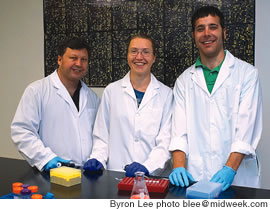Reversing Hawaii’s Brain Drain

Hard at work in the science lab are (from left) Dr.
Andrew “David” Hieber, Cristi Richards and Nick
Shubin
A recent article on Forbes.com titled America’s Best Paying Jobs ranked Hawaii as being the top paying state nationally in several job categories. The catch was that the Aloha State was tops in terms of pay for waiters, bartenders and lifeguards. Of course, that’s good news if you’re a waiter with an inexpensive place to live, no health problems and no kids to raise. Otherwise, even a “good-paying” waiter job, which according to the Forbes piece pays $22,590 a year, doesn’t go far.
Fortunately Hawaii is starting to produce more jobs in higher-paying categories. For example, biotech startup companies such as our own firm Cardax Pharmaceuticals are hiring highly skilled professionals, including kama’aina, who are returning home after spending years working on the Mainland.
This was the theme of a recent Island Insights show, the PBS Hawaii news program hosted by venerable MidWeek columnist and UH-West Oahu professor Dan Boylan. He interviewed several kama’aina who had recently come back to Hawaii to fill jobs they never dreamed would be available.
As Mr. Boylan’s show illustrated, the concept of creating new jobs in the life sciences and technology industries is not just “happy talk.” The individuals he interviewed point to a clear trend - the brain drain that plagued our state for decades is beginning to reverse.
So who are these kama’aina returning from the Mainland, and what Hawaii startup biotech firms are bringing them back home?
Ryan Yanagihara is a case in point. A graduate of Pearl City High and UH, Ryan was happily ensconced in Silicon Valley when he heard that Aiea-based Hawaii Biotech Inc. had a controller position that was both challenging and well-paid. Coming back to Oahu for a good-paying, meaningful job was an offer, as they say in the movies, that he couldn’t refuse.
Another Pearl City High graduate, Dan Inoshita, also moved back to Hawaii from Silicon Valley where he traveled the globe as a troubleshooter for semiconductor maker KLATencor and Sony. Although he returned to care for his ailing father, he was swiftly recruited by Oceanit, a Honolulu IT and engineering company that develops life sciences and aerospace products. Now, as Dan says, he’s here for the “long haul.”
It’s not only men who are coming home. Teresa Wong, a product of Sacred Hearts Academy in Kaimuki, also came back from California to become vice president of operations at Cardax Pharmaceuticals, the company I run. She spent seven years doing patient care and conducting clinical research at the prestigious UCLA Medical Center, but now says she’s got the best of all worlds - the chance to work for a fast-growing biotech company and to enjoy the ‘ohana spirit of the Islands.
Other returnees include Jaime Horton, a Punahou School and Yale grad snapped up by Honolulu-based Tissue Genesis; Gerran Ueyama, a Big Island-bred software engineer with a graduate degree from Stanford University who returned home to work for Lockheed Martin in Honolulu; Chad Ohira, a Punahou and USC-educated software engineer recently hired locally by defense giant BAE; and physician Hank Wuh, who returned from a position as an orthopedic surgeon at Stanford to found Cellular Bioengineering in Moiilili. There are many others.
“A Good Salary Is Hard to Find,” as the Forbes article said, if you want to be the best-paid bartender in the nation, Hawaii is the place to go. However, a bartender’s salary comes to $20,170 annually.
Compare that salary to the average pay for an entry level biotech job in this state, which is about $50,000. Those with advanced degrees can start even higher, and those with experience make even more. Naturally, not every student is going to earn a Ph.D. in microbiology, but our industry also offers good salaries for technicians with AA degrees who will be needed to work in our current labs, as well as the future pharma and vaccine manufacturing facilities that will be needed if we can develop a biotech/life science industry here.
New industries, creating new jobs filled by returning kama’aina, point to a growing and important trend. Today, technology is here in Hawaii and it’s creating the kinds of high-paying positions that will allow our state to compete with the Mainland for the best and brightest of our kama’aina who want to return home. These jobs will help Hawaii create a 21st century economy, one that can match up with emerging biotech/life science centers around the country and around the world.
Make no mistake about it - jobs in our growing life sciences and technology industries pay well and offer a chance for young people to make a difference in the future of Hawaii.
David G. Watumull is the chief executive officer of Cardax Pharmaceuticals, an Aiea-based startup that targets inflammatory diseases, including cardiovascular disease, hepatitis C and macular degeneration. He is a former CEO of Hawaii Biotech Inc. and was one of the Star-Bulletin’s “Ten Who Made a Difference” in 2004.
E-mail this story | Print this page | Comments (0) | Archive | RSS Comments (0) |
Most Recent Comment(s):




 Del.icio.us
Del.icio.us








